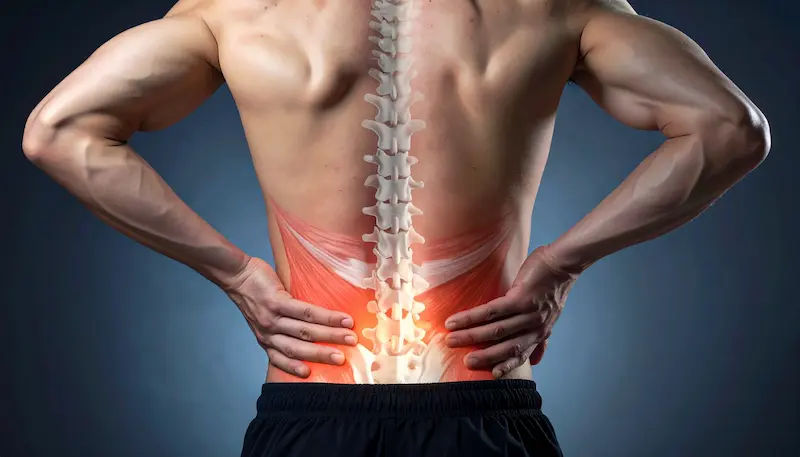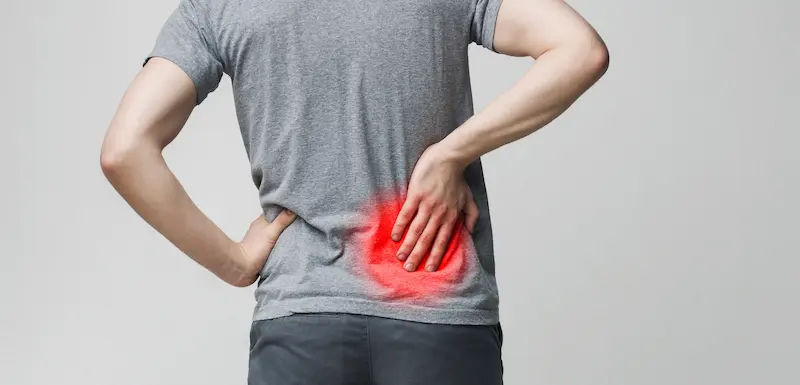Ways to Prevent Back Pain and Improve Spinal Health
Discover effective strategies to prevent back pain and maintain spinal health, including posture tips, exercises, and lifestyle habits for a stronger, pain-free back.

Written by Dr. J T Hema Pratima
Reviewed by Dr. Rohinipriyanka Pondugula MBBS
Last updated on 13th Jan, 2026

Introduction
Are you tired of that nagging ache in your lower back after a long day at work? You're not alone. Back pain is one of the most common medical problems worldwide, affecting up to 80% of adults at some point in their lives. It can range from a dull, constant ache to a sudden, sharp sensation that leaves you immobilised. The good news is that most back pain is preventable and often linked to our daily habits and lifestyle choices. This isn't just about quick fixes; it's about building a foundation of spinal health that will support you for years to come. This comprehensive guide will walk you through ten proven, practical strategies, from optimising your workspace and mastering your movement to strengthening your core and making smarter lifestyle choices, to help you stop back pain before it starts and reclaim a life of comfort and mobility.
Understanding Your Spine: The Root of the Problem
To prevent back pain effectively, it helps to understand what you're protecting. Your spine is a complex structure of bones, joints, ligaments, and muscles. You can think of it as the central pillar of your body, providing support and allowing for movement while protecting the delicate spinal cord.
The Anatomy of Back Pain
The spine is made up of 24 individual bones (vertebrae) stacked on top of each other. Between these bones are soft, gel-like discs that act as shock absorbers. Spinal health depends on all these parts working in harmony. Pain often occurs when these structures are stressed. For example, straining a muscle or ligament, which can happen from a sudden awkward movement or repeated heavy lifting, is a common cause of acute pain.
Common Causes of Acute and Chronic Pain
Acute back pain often stems from specific incidents like improper lifting, a fall, or a sudden twist. Chronic pain, however, is more complex and can be caused by conditions like degenerative disc disease, arthritis, or a herniated disc. Often, it's not one single event but a combination of factors like poor posture, a sedentary job, weak core muscles, and excess weight that gradually lead to discomfort.
Consult Top Orthopaedicians
Master Your Movement: Daily Habits for a Healthy Back
Your daily movements, from how you sit to how you pick up a pen, have a cumulative impact on your back.
The Art of Perfect Posture
Good posture is the cornerstone of back pain prevention. It maintains the natural curves of your spine and ensures weight is distributed evenly.
Sitting Correctly at Your Desk
For those wondering how to prevent lower back pain at work, it starts with your chair. Choose a chair with good lumbar support that supports your lower back's curve. Your feet should rest flat on the floor, and your knees should be at or slightly below hip level. Your screen should be at eye level to avoid hunching.
Standing and Walking with Alignment
When standing, bear your weight primarily on the balls of your feet, keep your knees slightly bent, and stand with your feet shoulder-width apart. Let your arms hang naturally. Tuck your stomach in and keep your head level, with your earlobes in line with your shoulders.
Lift Smart, Not Hard: Proper Lifting Techniques
Never bend from your waist to lift. This is a prime cause of injury. Instead, get close to the object, bend your knees and hips (squat down), keep your back straight, and tighten your core as you lift using your leg muscles. Hold the load close to your body and avoid twisting while lifting.
Design Your Environment for Spinal Support
Your surroundings play a huge role in your spinal health. A few simple tweaks can make a world of difference.
Creating an Ergonomic Workspace
An ergonomic chair is a worthy investment. If that's not possible, use a small pillow or a rolled-up towel for lumbar support. Ensure your keyboard and mouse are within easy reach so you don't have to strain your shoulders. Take a break to stand up, walk around, and stretch every 30 minutes.
Choosing the Right Mattress and Sleeping Position
Your mattress should be supportive but not too hard. A medium-firm mattress is often best for preventing back pain. The best sleeping position for your back is on your side with your knees slightly bent. You can place a small pillow between your knees to keep your spine aligned. If you sleep on your back, placing a pillow under your knees can help maintain the natural curve of your lower back.
Strengthen Your Foundation: Exercise and Core Stability
A strong body is a resilient body. Regular exercise is one of the most effective ways to prevent back pain.
Best Exercises for Back Pain Prevention
Low-impact aerobic activities like walking, swimming, or cycling can increase blood flow to the back and promote healing. Strength training is crucial, particularly for your core muscles: the abdominals, back, and glutes. These muscles act as a natural corset for your spine. Exercises like bridges, planks, and bird-dogs are excellent for core strengthening for beginners.
The Role of Flexibility and Stretching
Tight muscles, especially in the hamstrings, hips, and glutes, can pull on the pelvis and contribute to back pain. Incorporating a daily stretching routine or practices like yoga or Pilates can dramatically improve your flexibility and reduce strain on your spine.
Lifestyle Choices That Impact Your Back Health
What you do outside the gym and office matters just as much.
Maintaining a Healthy Weight
Excess weight, especially around the midsection, shifts your center of gravity forward and puts additional strain on your lower back. Losing even a small amount of weight can significantly reduce this pressure and lower your risk of back pain.
The Importance of Nutrition and Hydration
A diet rich in anti-inflammatory foods (like leafy greens, fatty fish, and berries) can help manage inflammation that may contribute to pain. Staying hydrated is equally important, as the discs in your spine are primarily composed of water. Dehydration can cause them to shrink, reducing their shock-absorbing ability.
Why You Should Quit Smoking for Your Back's Sake
Smoking reduces blood flow to the lower spine, which can prevent nutrients from reaching the spinal discs, making them more susceptible to injury and slower to heal. Smokers also have a higher reported incidence of back pain.
Conclusion
Preventing back pain is not about a single magic bullet but about integrating a series of smart, healthy habits into your daily life. It's a proactive journey of understanding your body, moving with intention, and creating an environment that supports your spinal health. By focusing on proper posture, ergonomic setups, consistent core strengthening, and positive lifestyle choices, you can build a resilient back that is far less susceptible to injury and pain. Remember, consistency is key. Start by implementing one or two changes from this list, and gradually build from there. Your back is the foundation of your mobility and vitality; investing in its health is one of the most important things you can do for your long-term well-being. If you experience persistent or severe pain despite these preventative measures, it's crucial to seek professional advice.
Consult Top Specialists
Consult Top Orthopaedicians

Dr. Sudipta Saha
Orthopaedician
8 Years • MBBS,(D. Ortho)
Kolkata
VDC Clinic, Kolkata

Dr. Rupam Chowdhury
Orthopaedician
10 Years • MBBS, DNB (Ortho.)
Kolkata
MCR SUPER SPECIALITY POLY CLINIC & PATHOLOGY, Kolkata

Dr. Alla Sai Pranay
Orthopaedician
10 Years • MBBS, MS ORTHOPAEDICS, FIJR,FIAS, Fellowship in Robotic Knee Arthroplasty, Arthroscopy and Sports Medicine (FRANCE)
Hyderabad
Apollo Hospitals Jubilee Hills, Hyderabad
(275+ Patients)

Dr.awari Uday Kumar
Orthopaedician
5 Years • MBBS, D-ORTHOPEDICS
Hyderabad
Apollo Hospitals Jubilee Hills, Hyderabad

Dr Dayakar Babu Jakkula
Orthopaedician
3 Years • MBBS, MS Ortho, FIJR, FELLOWSHIP in ARTHROPLASTY and ROBOTIC ASSISTED SURGERY.
Hyderabad
Apollo Hospitals Jubilee Hills, Hyderabad
Consult Top Specialists

Dr. Sudipta Saha
Orthopaedician
8 Years • MBBS,(D. Ortho)
Kolkata
VDC Clinic, Kolkata

Dr. Rupam Chowdhury
Orthopaedician
10 Years • MBBS, DNB (Ortho.)
Kolkata
MCR SUPER SPECIALITY POLY CLINIC & PATHOLOGY, Kolkata

Dr. Alla Sai Pranay
Orthopaedician
10 Years • MBBS, MS ORTHOPAEDICS, FIJR,FIAS, Fellowship in Robotic Knee Arthroplasty, Arthroscopy and Sports Medicine (FRANCE)
Hyderabad
Apollo Hospitals Jubilee Hills, Hyderabad
(275+ Patients)

Dr.awari Uday Kumar
Orthopaedician
5 Years • MBBS, D-ORTHOPEDICS
Hyderabad
Apollo Hospitals Jubilee Hills, Hyderabad

Dr Dayakar Babu Jakkula
Orthopaedician
3 Years • MBBS, MS Ortho, FIJR, FELLOWSHIP in ARTHROPLASTY and ROBOTIC ASSISTED SURGERY.
Hyderabad
Apollo Hospitals Jubilee Hills, Hyderabad
More articles from Back Pain
Frequently Asked Questions
Is walking good for lower back pain?
Yes, walking is excellent for lower back pain. It’s a low-impact aerobic exercise that increases blood flow to the spinal structures, reduces stiffness, and strengthens the supporting muscles without putting undue stress on the back.
How long should I rest if I have acute back pain?
While short-term rest (a day or two) can help with severe pain, prolonged bed rest is not recommended. It can lead to muscle stiffness and weakness. It's better to stay moderately active with gentle movements and walking to promote healing.
What are the signs that my back pain is serious and I should see a doctor?
You should consult a doctor if your back pain is severe, doesn't improve with rest after a few weeks, is accompanied by fever, unexplained weight loss, or if you experience numbness, tingling, or weakness in your legs, or loss of bowel or bladder control. If your condition does not improve after trying these methods, book a physical visit to a doctor with Apollo24|7 for further evaluation.
Can a bad mattress really cause back pain?
Absolutely. A mattress that doesn't provide adequate support can cause or exacerbate back pain by allowing your spine to sag out of alignment during the night. This puts strain on your muscles and ligaments.
Are there any specific vitamins or supplements that help with back pain?
Some studies suggest that anti-inflammatory supplements like Omega-3 fatty acids and spices like turmeric may help. Furthermore, Vitamin D and Calcium are crucial for bone health. A deficiency can contribute to pain. Apollo24|7 offers a convenient home collection for tests like vitamin D to check your levels.




